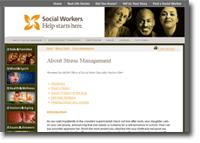Helpful Stress Reduction Information
 Social Workers offers their visitors useful information and resources for stress management that may be invaluable for those coping with PTSD -- or caring for them. Great pages to check out:
Social Workers offers their visitors useful information and resources for stress management that may be invaluable for those coping with PTSD -- or caring for them. Great pages to check out:
- How Social Workers Help Veterans and Their Families
- About Stress Management
- Stress Management - Your Options
- Stress Management Current Trends - Guided Imagery
- Stress Management Tip Sheets
Click on 'Article Link' below tags for more...
In educational interest, article(s) quoted from extensively.
Continuing:
The Impact of Stress on the Body
* Cardiovascular system – High levels of cortisol can raise your heart rate, increase blood pressure and blood lipid levels. These are risk factors in heart attack and strokes.
* Immune system – Did you ever wonder why you appear to catch more colds and come down with other infections when you’re stressed? Chronic stress tends to weaken you immune system making you more susceptible to whatever is “going around.”
* Nervous system – If your flight-or fight response system never shuts down, stress hormones can produce constant feeling of helplessness, anxiety and impending doom.
* Digestive system – Is it any surprise that you you’ll be stricken with a bout of diarrhea or a queasy stomach when you’re under stress? This happens because stress hormones slow the release of stomach acid and the emptying of the stomach. The same hormones also stimulate the colon, which speeds the passage of its contents.
Self-Help Strategies
You can do many things to help alleviate or quell stress without medications or intervention, starting simply with breathing.
Close your eyes, breathe deeply, and try to answer this question. When was the last time you felt truly relaxed? What was happening in your life? Very likely you were in a quiet, comfortable place where there was no pressure to do anything, and you could sit back and enjoy the day. You felt peaceful and at one with the world. For most people, that’s the definition of a vacation.
Think of it this way: Your body needs a vacation every day. Here are some ways to achieve that.
* Deep Breathing - When we are stressed, our breathing becomes shortened to the point that we can hyperventilate if we are faced with acute stress. Counter the natural instinct by deliberately taking four deep breaths every time you feel stressed. Slowly breathe in through your nose, hold it for five seconds and then release the air through your mouth.
* Exercise - Ongoing muscular tension goes hand in hand with chronic stress response. Counteract it by taking a brisk walk, playing a round of tennis, swimming a few laps. The goal is to keep your body limber and moving. For a more relaxing form of exercise, consider taking a yoga class or even tai chi.
Many gyms, community centers and adult night schools offer classes in this increasingly popular disciplines.
Set aside at least 10 minutes of your day to simply sit and be. It’s easier said than done, yet the benefits are tremendous. Meditation practices are equally helpful in teaching people how to quiet their thoughts and totally relax.
Keeping Diaries and Journals
Some people find solace in the privacy of their journals or diaries. Studies have shown that writing about stressful events or even huge, traumatic experiences can help to alleviate the stress and even improve the immune system. Again, community colleges, adult night schools and sometimes even hospitals offer classes in “ journaling” or therapeutic writing.
If you find that despite your best efforts to get a handle on things in your life, stress seems to be overtaking you, impeding you from living as you’d like to, making you feel chronically tired, or hopeless, a social worker may be able to help.
The goal of meeting with a skilled social worker would be to guide you to come up with a workable plan to help reduce or alleviate the stress in your life. This may entail psychotherapy to help you determine the source of the stress.


